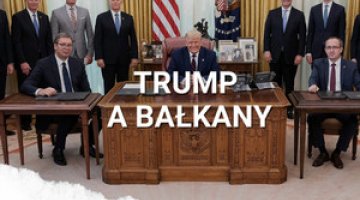Joy overshadowed by crisis. Serbia has been granted EU candidate status
On 2 March, the European Council granted Serbia the status of official EU candidate. This decision crowns the process of reforms and changes in foreign policy introduced by the Boris Tadić’s government. The changes which have been taking place in Serbia over the past four years are proof of the EU enlargement policy’s efficiency, since meeting the conditions set by the EU was the key motivation for the government’s transformational activity.Serbia’s continuation of reforms and good relations with its neighbours will depend on the outcome of the parliamentary election scheduled for late April/early May this year and on the stance the future government will take on EU membership. Candidate status certainly strengthens Serbia’s pro-European orientation, but the public – tired with the long-lasting reform process and economic crisis – cares less and less about the process of European integration.
Belgrade’s efforts to be granted candidate status
The government, which was formed in 2008 and in which the pro-European Democratic Party (DS) predominates, focused on adjusting Serbian law to EU requirements and on meeting the political criteria of accession, including keeping good relations with the other countries in the region. In 2011, Ratko Mladić and Goran Hadžić, the final two key suspects charged with war crimes, were detained and transferred to the International Criminal Tribunal for the former Yugoslavia (the lack of sufficient collaboration with the Tribunal had been the main impediment to Serbia’s integration with the EU since 2000). President Tadić also became engaged in the process of reconciliation in the region, which resulted not only in an improvement of relations with Croatia and Bosnia and Herzegovina, but also, in 2010, in the Serbian parliament adopting a declaration which condemned the crimes committed by Bosnian Serbs in Srebrenica. In March 2011, Serbia also became engaged, under pressure from the EU, in the negotiating process with the government of Kosovo, whose independence it refuses to recognise. Despite numerous points of dispute and incidents in frontier territories, Belgrade and Priština signed a number of agreements, for example, concerning civil registers, the free movement of people and the mutual recognition of documents (2 July 2011), the free movement of goods (2 September 2011), the integrated border management system (3 December 2011) and Kosovo’s participation in regional assemblies (24 February 2012).
Serbia has met a number of conditions in the area of internal security as part of the visa liberalisation process, which is taking place in parallel with its EU integration and, owing to this, the visa requirement was lifted for Serbian citizens travelling to the Schengen Area in December 2009.
Decreasing interest in EU membership?
The level of support for EU membership among the Serbian public has been successively falling. In January this year, it reached 45%, the lowest level since 2000. This is an effect of the deepening economic crisis and the fatigue with the enlargement process in both Serbia and the EU.
EU member states are now focused on overcoming the economic crisis and are increasingly reluctant to continue the enlargement process and to finance the aid for candidate states. A consequence of this is that the criteria for accession to the EU have consistently been made stricter. Furthermore, internal problems in the EU have been successfully drawing attention away from the enlargement policy. The tendency to use the enlargement policy by some countries to serve their own interests in bilateral relations with other EU member states or more broadly at the EU forum is also strengthening (for example, Romania made its consent to grant candidate status to Serbia dependent on strengthening the protection of the Romanian minority in Serbia and emphasised that the EU should finally allow Romania to join the Schengen Area). This has reinforced the conviction among the Serbian public that the decisions taken in the enlargement process are arbitrary and depend only to a small extent on meeting the conditions set by the EU.
The main problem for the Serbian public is the currently deteriorating economic situation. This has caused a significant increase in the rate of unemployment (which has risen by 24%) and a deterioration of living standards as a consequence of the freezing of wages and pensions. The chances that the economic situation will improve soon are low. The influx of foreign investments, which had boosted growth thus far, has fallen dramatically, and the government has no sufficient funds to stimulate economic growth. The economic crisis has verified the belief held by the Serbian public so far that progress in integration with the EU will be a remedy for structural problems and will automatically lead to an improvement of the situation in the country. The lack of any tangible positive effects of reforms which have been implemented in connection with EU integration is also making the public more convinced that the government should focus on resolving economic problems and not on formal progress in the process of integration with the EU.
The consequences
Candidate status for Serbia means first of all more money from the EU’s pre-accession funds (three components of the IPA fund) and the improvement of its image in the international community. Serbia’s ongoing integration with the EU is also reinforcing the stabilisation of the entire region, given the strong impact Belgrade’s policy has on the situation in the neighbouring countries (BiH, Kosovo and Montenegro). For the present government, the decision of the European Council means the crowning of the efforts it has been making for four years and is proof that its policy aimed at moving closer to the EU has been successful. However, this will have a limited impact on the result the government coalition will achieve in the election, since it is the current economic situation and not integration with the EU which is set to be the pivotal issue in the pre-election campaign.
According to the latest poll results, the moderately nationalist Serbian Progressive Party (SNS) stands the greatest chance for victory, with its support level at almost 33%. The alliance of groupings built by the Democratic Party comes second, with support at 26.7%. However, since there is a large amount of swing voters’ (approximately 21%), it is difficult to assess at present who will finally form the government. SNS leaders are declaring that if they take over power, the policy of integration with the EU will be continued. It still cannot be ruled out that the will to support ethnic Serbs in the neighbouring countries will finally prevail and this may make Serbia withdraw from its agreements with Kosovo and cause an escalation of tension in the region. If such a scenario were to come about, the process of Serbia’s accession to the EU would be suspended.




